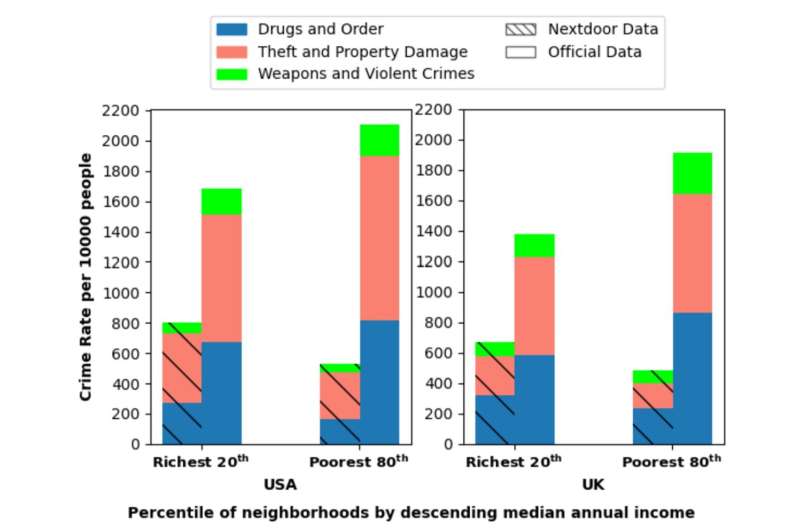This article has been reviewed according to Science X's editorial process and policies. Editors have highlighted the following attributes while ensuring the content's credibility:
fact-checked
trusted source
proofread
Social media posts can be used to track individuals' income and economic inequalities

Striking differences in the content shared by people who live in wealthier versus poorer neighborhoods has led researchers to believe that our general online posting activity, beyond Nextdoor, can reveal our socioeconomic status, making user profiling possible.
Knowing users' income could allow social media platforms to recommend income-based content, and advertisers and online shops can target people based on their economic profile and offer specific products at different prices based on their income level.
The findings of the study also show that people who live in wealthier neighborhoods were more likely to share positive posts but would discuss crime more, even if the actual crime rates are lower than in poorer neighborhoods.
Dr. Ignacio Castro, lead researcher and Lecturer in Data Analytics at Queen Mary University of London, said, "Our study shows that the text posted by users in poor neighborhoods is distinguishable from the text generated in wealthier neighborhoods. Online users' content reveals socioeconomic factors: in wealthier neighborhoods there is more crime-sensitive posting activity, but overall, more positive sentiment in the posts."
This is the first large-scale study of Nextdoor, published on June 2 in the Proceedings of the International AAAI Conference on Web and Social Media, that shows how income levels and income inequality within neighborhoods manifests online.
Researchers collected and analyzed 2.6 million posts from 64,283 neighborhoods in the United States and 3,325 neighborhoods in the United Kingdom, shared on Nextdoor between November 2020 and September 2021. With 10 million users, the platform allows verified residents to share posts on forums that are dedicated to their neighborhoods. The study results are consistent in both countries.
Residents who live in richer neighborhoods are more concerned about crime with the 20% richest neighborhoods discussing crime approximately 1.5 times more compared to the poorest neighborhoods. This happens even though crime levels are 1.3 times higher in those poorer neighborhoods. People who live in wealthy neighborhoods with less inequality discuss crime more than anyone else.
Regarding the type of crimes talked about, non-violent crimes are discussed more than violent crimes. Most user content trends are very similar between the US and the UK, with one notable distinction when it comes to weapons and violent crimes, which are discussed more in the US than in the UK for the richer neighborhoods. This is not the case for middle income neighborhoods, as UK residents tend to post about this type of crime more than their US counterparts.
More information: Study: ojs.aaai.org/index.php/ICWSM/article/view/22155
Provided by Queen Mary, University of London



















